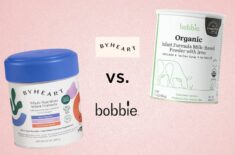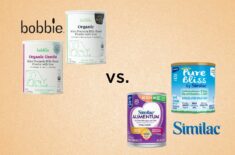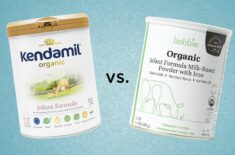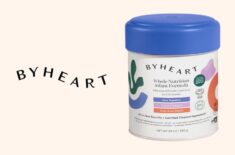Overview
Recent major analysis published in “The Lancet” journal declares that less than 50% of the world’s babies are being breastfed because “formula companies are exploiting parents’ fears for profit”. (1)
Not surprisingly, the study discovered that the baby formula industry generates around $55 billion annually in revenues while spending around $3 billion on marketing activities each year. (1)
The three-paper series conducted by different researchers, including Prof. Nigel Rollins and Dr. Phillip Baker, suggests that the formula companies are exploiting parents’ fears to deepen their own pockets. (2)(3)(4)
Despite this recent analysis, the baby formula controversy isn’t new.
It’s also important to note that although breastmilk has shown some benefits over baby formula, your baby isn’t doomed if you feed them formula. Plenty of formula-fed babies are well-developed, and grow up to be healthy children and adults.
It should also be noted that new, more responsible and family-centered baby formula brands such as ByHeart, Bobbie, and Serenity Kids Toddler Formula have recently come to market and disrupted the industry.
Always remember mama, fed is best.
Let’s discuss more about this below.
What Was The Infant Formula Controversy?
In the 1970s, Nestle figured in an infant formula controversy after being accused of promoting their products and getting third-world moms “hooked” on formula. (5)(6)
The brand earned the moniker “The Baby Killer,” coined by the War on Want organization. (5)(6)
A Swiss court found news reports libelous, particularly a Swiss article entitled “Nestlé Toten Babies” (Nestlé Kills Babies). (6)
However, the same court also told the company to “change the way they did business,” such as modifying their marketing strategy. (5)(6)
Nestle reportedly marketed baby formula at the time through sales reps wearing nurses’ uniforms. (5)(6)
The War on Want organization alleged that the reps’ sales pitch preyed on moms’ fears of harming their newborns by reportedly telling them breastfeeding was best, but baby formula was better to avoid “unnecessary problems.” (5)
Millions of babies died of malnutrition in many third-world countries. Most deaths are due to moms diluting the baby formula to stretch their supply. The products were too expensive for them, but allegedly, they felt guilty breastfeeding. (5)(6)
Other babies died because their moms used contaminated water in preparing their formula. (5)(6)
Dr. Stephen Joseph, a USAID (United States Agency for International Development) official, put the blame solely on the baby formula companies. (5)(6)
The controversy led to changes in how baby formulas are marketed, known as the International Code of Marketing of Breast-Milk Substitutes (e.g., companies aren’t allowed to promote their products through ads or free samples). (7)
Sadly, this recent analysis in The Lancet shows that companies are still boosting their sales by preying on parents’ fears. (1)
How Do Formula Companies Exploit Parents’ Fears & Undermine Breastfeeding?
The Lancet series alleges that baby formula companies “manipulate” scientific data and exploit parents’ emotions to influence them to formula-feed over breastfeeding: (3)(8)
- Making moms feel that breastmilk alone isn’t enough
- Products are marketed as “closest to mother’s milk”
- Some products are supposedly designed to “alleviate” colic, fussiness, etc.
- Products specifically made to promote better sleep or address sensitivities (e.g., hypoallergenic formulas)
- Diversified but nearly identical products to establish and promote brand loyalty (e.g., baby formula, toddler formula, growing-up milk, etc.)
- Claims of products promoting higher IQ, better academic performance, long-term cognition, etc. (e.g., labels that use “IQ,” “neuro,” “brain,” etc.)
- Using legitimate health professionals and institutions to promote their products
- Using social media influencers to reach more parents
Even with the stark differences in human milk and baby formula compositions, the Lancet analysis suggests that baby formula companies depict breastfeeding as “generic, outmoded, and antifeminist.” (3)(9)
Some moms have milk production issues and need to supplement with formula. Some choose baby formula because it’s “scientifically formulated.” Others feel better because they have a sense of empowered choice from various products that offer different health benefits (e.g., more vitamins, iron, calcium, etc.). (3)
The analysis added that the different pricing strategies also make many moms feel that they should choose the more expensive products to make up for not breastfeeding their babies, exploiting their guilt. (3)
Formula companies can also influence parents to feel guilty when their baby cries because they didn’t provide the “right” formula for fussiness and colic. (2)
The Lancet researchers point out that crying is babies’ only communication method. Parental responses such as changing a wet diaper, rocking or other soothing techniques, or providing a pacifier might calm the baby. (2)
Yet many parents might mistakenly believe that changing to an “anti-colic” formula is the best solution for a constantly crying infant. (2)
Baby Formula Vs. Breastmilk
Remember, fed is best.
While the health benefits of breastmilk are well-documented, it’s ok to feed your baby formula too. As we mentioned, there are several superior choices on the market now. New players like Bobbie, ByHeart, and Serenity Kids are built by parents not corporations. These companies are putting baby’s nutritional interests above company profits.
Please don’t beat yourself up for formula-feeding or having to supplement with formula. Many, many formula-fed babies grow up to be perfectly healthy and thriving kids and adults.
What matters is what else you do at home. When you start feeding solids, what foods do you choose? Do you choose whole-foods rich in polyphenol and anti-inflammatory compounds like berries, broccoli, and wild-caught salmon? Do you choose unprocessed foods and items that can help build and strengthen your baby’s microbiome, gut health, and immune system like yogurt, kefir, pickles, and sauerkraut?
Do you supplement with a high-quality baby probiotic?
There are so many choices you can make that can set your kids up for a long, healthy life that don’t involve breastfeeding.
Is Breastfeeding Really Better?
Economist and data-driven parenting guru Emily Oster concedes that “there may be some advantages to breastfeeding early on.”
For example, some studies appear to show that breastfed children might have higher IQ test scores than non-breastfed children. (10)
However, Oster points out that there isn’t enough evidence that the higher test scores of breastfed children are because of the breastmilk they were taking. (10)
Oster explains on Yahoo Life: (10)
“Kids who were breastfed also tend to have moms with higher education; they tend to be from families with more resources; there are differences in the marital status of the parents.
And so when we say there are differences in these kids based on whether they’re breastfed or not, it’s really hard to separate that from all the other differences which we know to be related to test scores.”
Advantages Of Baby Formula
Although baby formula companies might be ‘preying’ on vulnerable parents with what some sectors call ‘false advertising,’ their products are still helpful, nutritious, and are, generally, safe for babies’ consumption.
Some moms are unable to breastfeed for various reasons. Whether this choice is voluntary or not, the availability of formula means that these moms can still provide their babies with nourishment.
Other advantages of formula-feeding:
- Supplemental nutrition when needed (especially if the mom doesn’t produce enough milk)
- Flexibility and convenience
- Ideal for babies with food allergies and sensitivities
- Moms don’t have to worry whether something they take (food, drinks, medicines, etc.) might pass through breastmilk
Oster also wants to acknowledge the benefits of formula-feeding on parents’ overall well-being: (10)
“There are benefits to parents being happy and feeling confident, and like they are doing a good job and not being depressed.
Now, is that necessarily delivered by formula? No. But I think it is true that for at least some people, the pressure to breastfeed, the anxiety around breastfeeding, the experience can really affect their mood [and] can really affect the way that their time with the baby goes. … I think we are not measuring that enough.”
Nicole Silber, the creator of Tiny Tasters (video-based feeding classes for moms and dads), a registered dietician, and certified lactation consultant also explains that baby formula is safe and nutritious: (10)
“As far as the food supply goes, baby formula is the most regulated product. So formula companies have to have very strict standards about the ingredients that can go in, about the composition.
It really does mimic breast milk as far as the percentage breakdown of the macronutrients, as well as the micronutrients.”
What Are The Risks Of Baby Formula?
It’s important to note that formula-fed babies don’t automatically develop the following conditions. However, they MAY have an increased risk, especially with genetic disposition or certain environmental factors.
It’s impossible to know if formula-fed babies who develop health issues later on did so directly because of the lack of breastmilk or due to other factors.
Possible health outcomes for babies who aren’t breastfed might include an increased risk of the following: (11)
- SIDS (sudden infant death syndrome)
- Pneumonia
- Gastroenteritis (intestinal infection)
- Lower respiratory tract infection
- Otitis media (infection of the middle ear)
- Childhood obesity
- Types 1 and 2 diabetes
- Leukemia (cancer of blood cells)
Premature babies fed with formula can also have an increased risk of NEC (necrotizing enterocolitis), a serious and potentially life-threatening infection that causes holes in the baby’s intestines. (11)
Moms who aren’t breastfeeding can also have increased risks of: (11)(12)
- Retained gestational weight gain
- Premenopausal breast cancer
- Ovarian cancer
- Type 2 diabetes
- Metabolic syndrome (conditions that increase risks of diabetes, stroke, and heart disease)
Suggested Health Benefits Of Breastfeeding
Some important benefits, especially with exclusive breastfeeding: (2)(11)
- Reduced risks of the illnesses or conditions listed above
- Development and maturation of the baby’s immune system
- Reduced risks of developing asthma, atopic dermatitis (eczema), viral infections, childhood cancers, obesity, and type 1 diabetes
- Reduced physiological stress for mom and baby
What Are Parents Using Instead Of Formula?
Breastfeeding or pumping your breastmilk can be the best option.
Getting supplies from a donor breastmilk bank can be a good option, but it’s vital to ensure you get these through reputable facilities that screen the donors. Ask your healthcare provider for recommendations in your area.
Safety risks of unscreened breastmilk donors include: (13)(14)
- Chemical contaminants (such as drugs)
- Infectious diseases (such as HIV or the human immunodeficiency virus)
- Pathogenic bacteria (from improper storage and handling)
Amid the formula shortage, you can try other brands, but with your pediatrician’s approval.
Babies 4-6 months and older can also get their nutritional needs from baby food when they show signs of readiness.
References
(1) https://www.thelancet.com/journals/lancet/article/PIIS0140-6736(23)00118-6/fulltext
(2) https://www.thelancet.com/journals/lancet/article/PIIS0140-6736(22)01932-8/fulltext
(3) https://www.thelancet.com/journals/lancet/article/PIIS0140-6736(22)01931-6/fulltext
(4) https://www.thelancet.com/journals/lancet/article/PIIS0140-6736(22)01933-X/fulltext
(5) https://www.businessinsider.com/nestles-infant-formula-scandal-2012-6#the-baby-killer-blew-the-lid-off-the-formula-industry-in-1974-1
(6) https://www.theguardian.com/sustainable-business/nestle-baby-milk-scandal-food-industry-standards
(7) https://www.ncbi.nlm.nih.gov/pmc/articles/PMC7967752/
(8) https://abcnews.go.com/Health/baby-formula-milk-companies-exploit-parents-fears-boost/story?id=96950161
(9) https://pubmed.ncbi.nlm.nih.gov/35248090/
(10) https://www.yahoo.com/lifestyle/emily-oster-breastfeeding-formula-data-180433565.html
(11) https://www.ncbi.nlm.nih.gov/pmc/articles/PMC2812877/
(12) https://www.ncbi.nlm.nih.gov/pmc/articles/PMC4842365/
(13) https://www.fda.gov/science-research/pediatrics/use-donor-human-milk
(14) https://americanpregnancy.org/healthy-pregnancy/breastfeeding/donor-milk/












